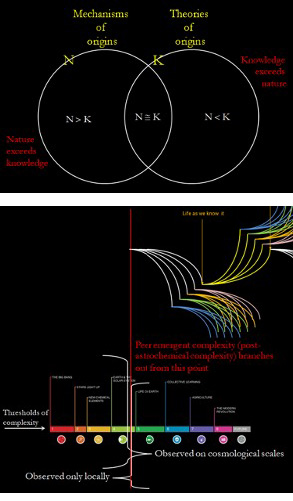
Nielsen Nick
Icarus Interstellar, Portland, Oregon, USA
 The study of origins of life, one of the major thresholds of emergent complexity, offers a unique window onto other forms of complexity on Earth and beyond. Life on Earth has grown in complexity as it has evolved, passing several major thresholds of emergent complexity specific to life, such as the eukaryotic cell, multi-cellular life, and the Cambrian explosion. Further emergent complexities arose from and out of life, such as ecological structures (the trophic pyramid, food webs, and ecological succession), eusociality, consciousness, technology, and civilization. That which we learn from the study of the origins of life may be relevant both to anterior forms of complexity upon which life supervenes, as well as later forms of complexity that supervene upon life.
The study of origins of life, one of the major thresholds of emergent complexity, offers a unique window onto other forms of complexity on Earth and beyond. Life on Earth has grown in complexity as it has evolved, passing several major thresholds of emergent complexity specific to life, such as the eukaryotic cell, multi-cellular life, and the Cambrian explosion. Further emergent complexities arose from and out of life, such as ecological structures (the trophic pyramid, food webs, and ecological succession), eusociality, consciousness, technology, and civilization. That which we learn from the study of the origins of life may be relevant both to anterior forms of complexity upon which life supervenes, as well as later forms of complexity that supervene upon life.
My interest in origins of life, then, is in the structures revealed by the origins and development of life, distinguishing what is peculiar to life as an emergent complexity, and perhaps also what is peculiar to life on Earth, from structures of emergent complexity that obtain in any context of complexity whatever—again, other forms of complexity that obtain on Earth, as well as complexity elsewhere in the Universe, whether biological or otherwise. If a distinction can be drawn between what is peculiar to life on Earth and what characterizes life, as such, as a form of emergent complexity, wherever it may be found, such a distinction can contribute to the formation of a universal biology.
There is, as yet, no consensus on a framework for emergent complexity, and the study of the origins of life may contribute to a future scientific research program in which such a consensus becomes possible. I approach these problems within a framework that I call emergent complexity pluralism, which recognizes the possibility of peer forms of complexity at each threshold of emergence.


